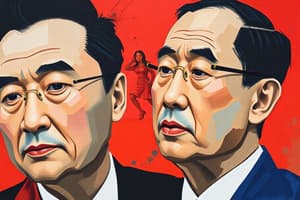Podcast
Questions and Answers
What is the main argument of Francis Fukuyama in 'The End of History'?
What is the main argument of Francis Fukuyama in 'The End of History'?
- History has ended with the establishment of socialist states.
- Liberal democratic states are the ideal form of political organization. (correct)
- The evolution of political thought is static and unchanging.
- Historical events have no bearing on modern political systems.
Which of the following is NOT one of the three requirements for a liberal democratic state according to Fukuyama?
Which of the following is NOT one of the three requirements for a liberal democratic state according to Fukuyama?
- Accountability to the law
- Sufficient strength and authority to enforce laws
- Global military dominance (correct)
- Implementation of the will of the citizenry
In what year did Francis Fukuyama publish 'The End of History and the Last Man'?
In what year did Francis Fukuyama publish 'The End of History and the Last Man'?
- 1985
- 1992 (correct)
- 1990
- 1995
Which term best describes the use of the word 'history' in Fukuyama’s argument?
Which term best describes the use of the word 'history' in Fukuyama’s argument?
What notable achievement is attributed to the song 'After the Ball' by Charles Harris?
What notable achievement is attributed to the song 'After the Ball' by Charles Harris?
Which event helped boost the sales of 'After the Ball' significantly?
Which event helped boost the sales of 'After the Ball' significantly?
Who was the author of 'The End of History'?
Who was the author of 'The End of History'?
What type of state do liberal democracies, according to Fukuyama, correlate with?
What type of state do liberal democracies, according to Fukuyama, correlate with?
What genre does 'Freedom! 90' by George Michael belong to?
What genre does 'Freedom! 90' by George Michael belong to?
Who directed the music video for 'Freedom! 90'?
Who directed the music video for 'Freedom! 90'?
What instrument is prominently featured in 'Losing My Religion' by R.E.M.?
What instrument is prominently featured in 'Losing My Religion' by R.E.M.?
What is the main theme of 'Losing My Religion'?
What is the main theme of 'Losing My Religion'?
Why was the term '90' added to the title 'Freedom!' by George Michael?
Why was the term '90' added to the title 'Freedom!' by George Michael?
What does the phrase 'losing my religion' mean in the context of the R.E.M. song?
What does the phrase 'losing my religion' mean in the context of the R.E.M. song?
Who wrote 'Losing My Religion'?
Who wrote 'Losing My Religion'?
What does George Michael express about freedom in 'Freedom! 90'?
What does George Michael express about freedom in 'Freedom! 90'?
Flashcards are hidden until you start studying
Study Notes
Francis Fukuyama’s "The End of History"
- Published a paper titled “The End of History?” in 1989, later expanded to a book in 1992.
- Argues that liberal democratic states and market economies represent the ideal political organization.
- Defines "history" as modernisation and development rather than a chronological account of events.
- A liberal democratic state is characterized by:
- Democracy: Conducts elections that reflect the will of the citizenry.
- Authority + Strength: State has sufficient strength and authority to enforce laws and administer services.
- Constrain: The highest representatives of the state are subject to the law.
Impact of 90s Music
- Explores how 90s music may reflect periods of global transition, contrasting with songs from other decades.
“After the Ball” by Charles Harris
- Released in 1892; first song to sell a million copies of sheet music.
- Tells the story of an old man reminiscing about his long-lost love.
- Gained popularity due to John Philip Sousa performing it at the 1893 World Columbian Exposition.
- A sentimental ballad that resonated emotionally with listeners of the 1890s.
“Freedom! 90” by George Michael
- Written and performed by George Michael, released in October 1990.
- Distinguishes from a previous Wham! song titled "Freedom" by adding "'90" to the title.
- Features a backing beat sampled from James Brown’s "Funky Drummer."
- Michael did not appear in the music video, which featured supermodels instead.
- Key themes include the pursuit of freedom and personal empowerment, as expressed in memorable lyrics.
“Losing My Religion” by R.E.M.
- Released in February 1991 as the first single from the album "Out of Time."
- Notable for its mandolin riff and explores themes of unrequited love.
- The phrase "losing my religion" denotes losing temper or civility, not actual faith.
- Michael Stipe described the song as a romantic expression about longing and frustration.
Studying That Suits You
Use AI to generate personalized quizzes and flashcards to suit your learning preferences.




